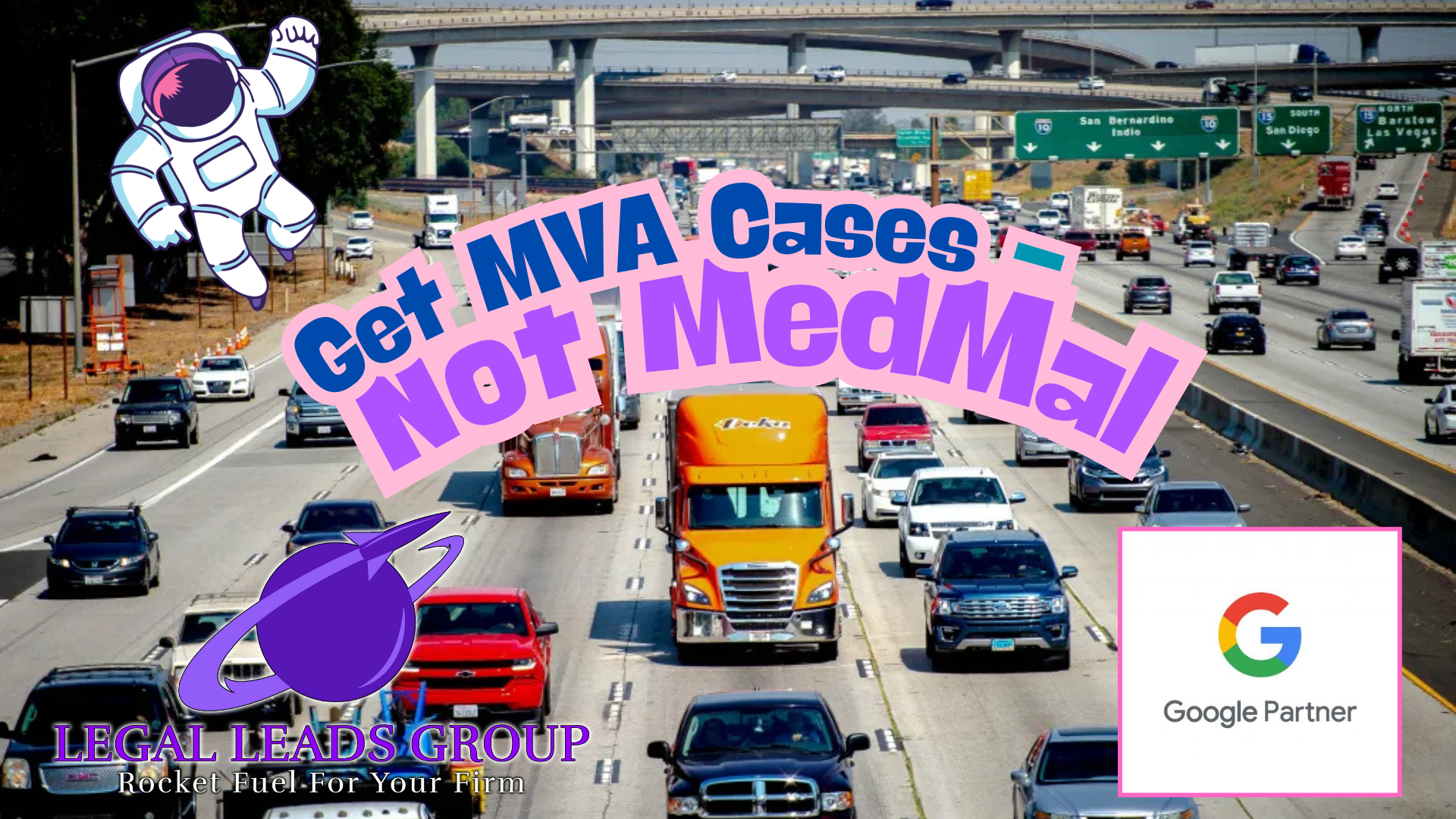How to Get Car Accident Cases Instead of Medical Malpractice Cases from Google Ads
If you’ve run Google Ads for your law firm, chances are you’ve been burned by irrelevant clicks, especially from people searching for medical malpractice help when you only want motor vehicle accident leads. That’s a common and costly mistake. The good news? You can shift your traffic and attract high-quality car accident cases while keeping your ad spend under control.
To make this pivot work, you need a targeted PPC strategy, a negative keyword list that blocks out bad matches, and a content plan that aligns tightly with your local market. For example, running ads that match Google searches like “Seattle rear-end accident lawyer” or “Tacoma car crash attorney near me” leads to better Quality Scores, stronger conversion rates, and fewer irrelevant calls. Google is constantly updating how ads match user intent. That’s why it’s essential to use reliable resources like Search Engine Land’s guide on match types to stay current. Without a refined strategy, your campaigns will attract the wrong cases and waste thousands.
At Legal Leads Group, we’ve helped law firms nationwide restructure their campaigns to focus solely on motor vehicle accident leads. Our landing pages, call tracking, and ad targeting all work together to improve your Google Ads Quality Score, which ultimately lowers your cost per click and increases signed cases. When you’re ready to stop paying for the wrong types of clicks and start bringing in real MVA clients, call us at 805-273-8791 for a tailored intake and Google Ads audit, or schedule a free lead consultation now.
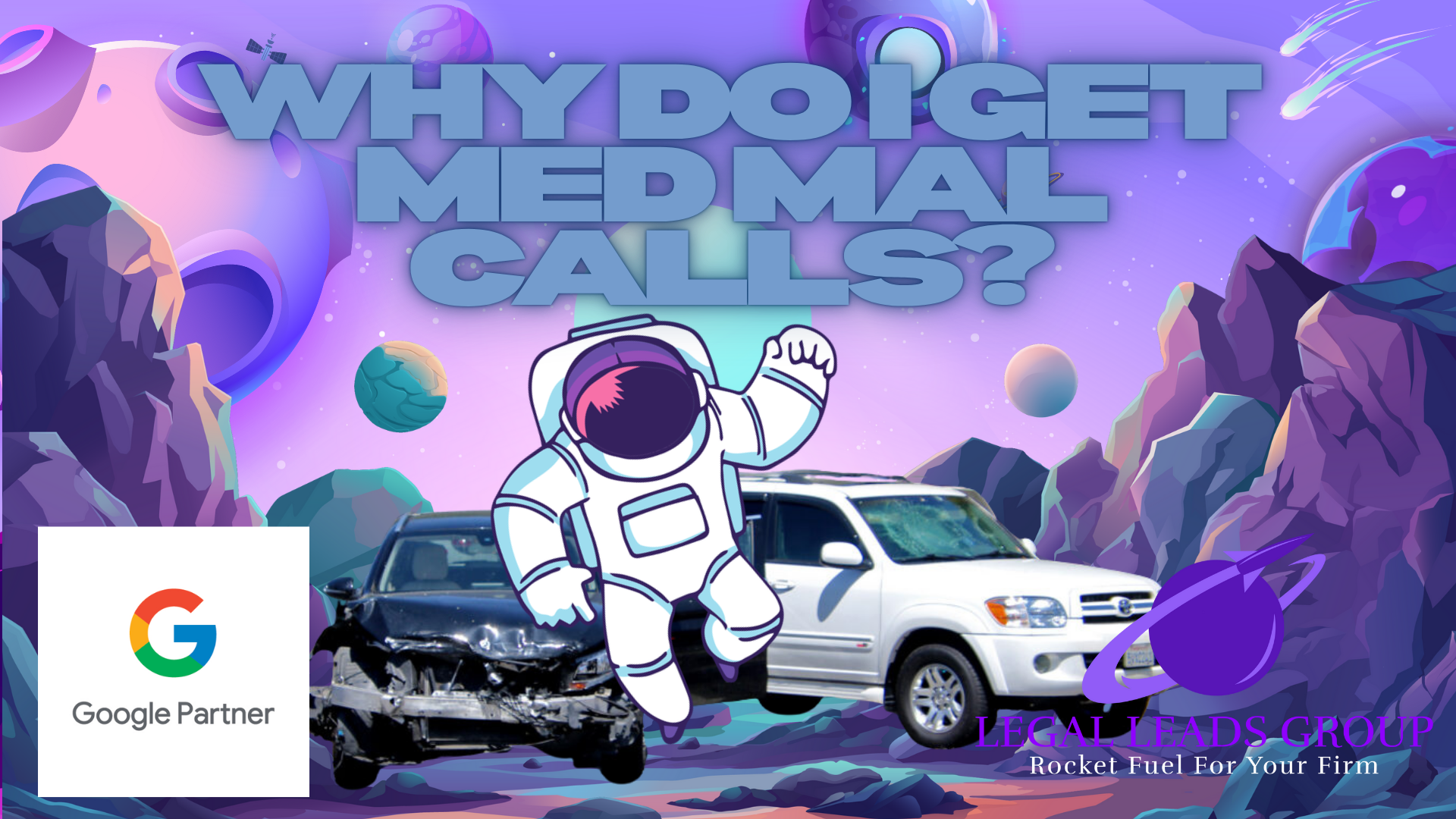
Why Are the Majority of My Calls from Google Ads Med Mal Instead of MVA Leads?
Many attorneys run ads expecting motor vehicle accident leads, only to receive calls from people looking for help with surgical mistakes or hospital negligence. This disconnect is not random. It is caused by how Google Ads interprets broad keyword targeting and how campaigns are structured. When your ad targeting is not configured precisely, Google’s algorithm will serve your ads for terms you never intended to show up for.
The impact is more than financial. It damages your Google Ads Quality Score, lowers your click-through rate, and floods your intake staff with unqualified callers. Fixing this issue starts with understanding how search match behavior and campaign structure influence the type of legal cases your firm receives.
Why Broad Match Campaigns Attract Medical Malpractice Queries
If your campaign runs on broad match keywords without strict controls, it opens the door to a wide range of unrelated queries. Google automatically pulls in phrases that may be technically related to personal injury law but not aligned with your actual intake goals.
Google’s Search Algorithm Often Misclassifies Legal Intent
Google’s automated systems associate terms like personal injury, legal negligence, or injury compensation across multiple practice areas. As a result, a campaign aimed at car crash claims in Everett might show up for someone searching for how to sue a hospital for negligence. Without careful segmentation, you risk paying top dollar for leads that will never retain.
To better understand how match types impact search results, review Search Engine Land’s breakdown on keyword behavior. Their guide shows how even a single broad term can cause major traffic issues.
Law Firms Across Seattle Face the Same Pattern
We analyzed campaigns targeting the greater Seattle metro, including King and Snohomish counties. One campaign included broad terms like injury lawyer near me. The firm saw hundreds of clicks but few consultations. After pulling the search terms report, it became clear that many users were searching for malpractice settlements, not auto collisions. Once the firm moved to tighter targeting, conversion rates jumped by 38 percent.
Why Phrase Match and Exact Match Improve Lead Quality
Unlike broad match, phrase and exact match keywords limit how and when your ads appear. These keyword types require the user’s search to either contain your phrase in order (phrase match) or exactly as written (exact match), keeping your targeting laser-focused.
Exact Match Captures High-Intent Car Accident Searches
When you use exact match targeting, Google will only show your ad to users who type in that exact phrase or close variants. For instance, car accident lawyer in Tacoma will only show for searches like Tacoma car accident lawyer or lawyer for car crash Tacoma. This method greatly reduces unqualified clicks. According to WordStream’s latest PPC benchmark data, exact match campaigns consistently produce better Quality Scores and lower average CPCs in legal industries.
Phrase Match Allows Strategic Flexibility While Filtering Out Noise
Phrase match gives you the ability to show ads for longer queries that include your core keyword. For example, targeting motor vehicle accident attorney might trigger ads for searches like best motor vehicle accident attorney in Spokane. It balances reach with control, especially when supported by strong negative keyword lists.
To ensure you’re only bringing in auto-related cases, use negative phrases like surgery, doctor, malpractice, hospital, and birth injury. Continuously update your list based on performance insights.
Campaign Structure Directly Impacts Lead Type and Quality Score
Your campaign’s structure plays a critical role in whether Google delivers the right leads. Combining different practice areas, like car accidents and malpractice, into the same campaign creates confusion both for the algorithm and your prospects.
Segmented Campaigns Keep Traffic Clean and Results Trackable
Each ad group should represent a single intent. For example, one group should focus on truck accident cases in Pierce County and another on rear-end crash claims in Spokane. Separate landing pages, ads, and keywords for each group allow you to increase relevance, which directly boosts your Google Ads Quality Score. Learn more about the impact of granular ad group setup in Instapage’s campaign structuring guide.
Geographic Keywords Help Google Serve the Right Audience
Adding local modifiers like Renton, Bellingham, or Vancouver WA to your keywords gives Google more context. People searching for legal help in their own city often include location-specific terms, and Google rewards advertisers who match this intent. Building these geo-targeted keywords into your campaigns increases both ad relevance and your chances of showing up in higher positions at a lower cost per click.
Why Your Ad Copy Should Reflect the Case Type You Want
Even with the right keywords, vague or broad ad copy can attract the wrong leads. Your headlines and descriptions must clearly state you only accept car accident cases, not general injury claims or malpractice lawsuits.
Use Headlines That Speak Directly to Crash Victims
Include action-focused phrases like Injured in a Car Wreck? or Crash Victim Seeking Legal Help? These messages filter out users with medical-related problems and ensure your firm appears hyper-focused on auto cases. This not only drives qualified clicks but also improves your expected CTR score in Google Ads.
Align Landing Page Copy with Your Ad Language for Higher Relevance
Once users click through, your landing page should reinforce your message. Use bold headlines like Start Your Auto Accident Case Evaluation Today and eliminate any language that mentions other types of personal injury law. A consistent message from ad to page creates a smoother user journey and elevates your Quality Score.
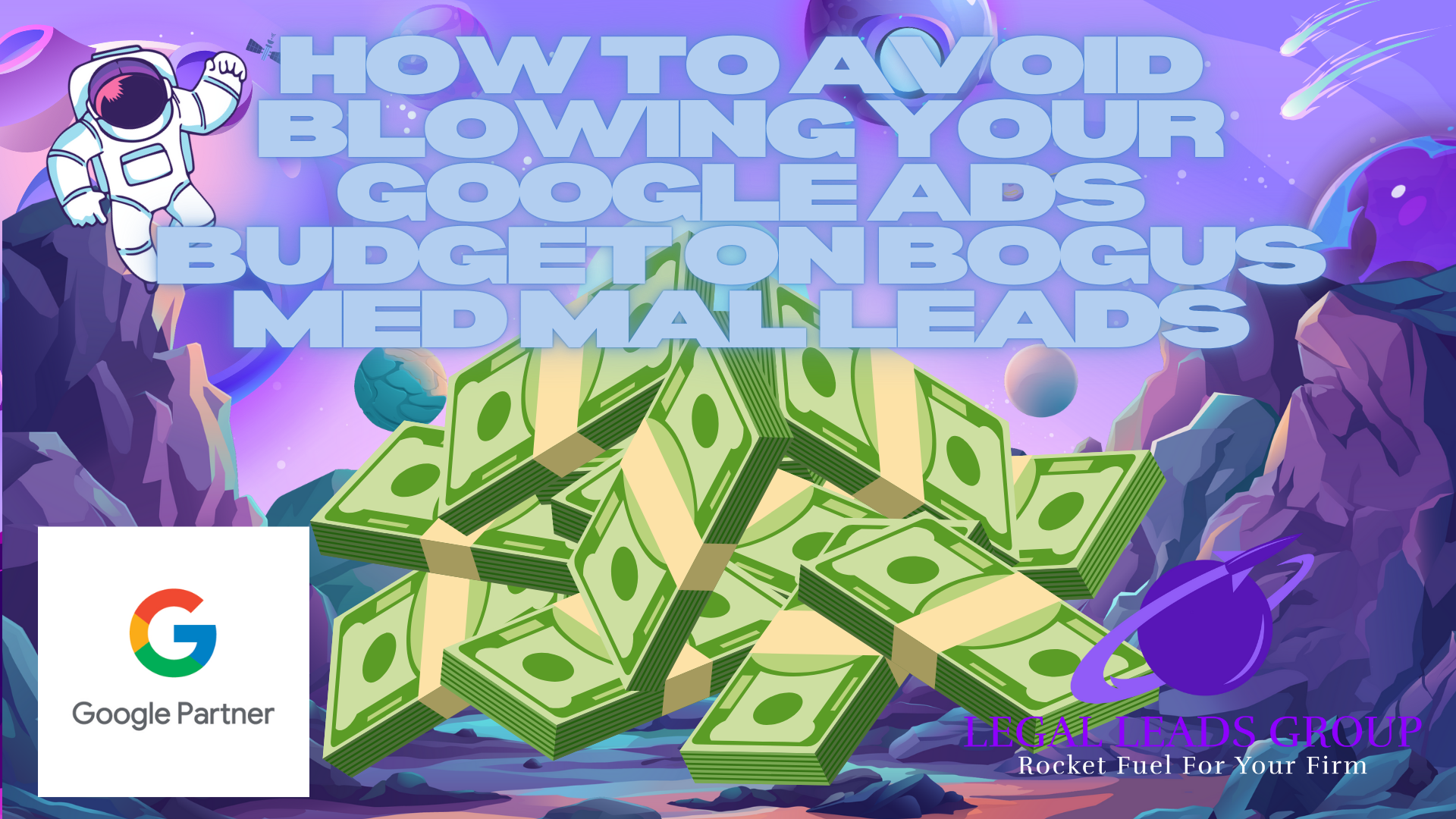
Avoiding Budget-Wastage on Medical Malpractice Keywords in Google Ads
Google Ads is a powerful tool for generating personal injury leads, but without precise targeting, your advertising dollars can quickly be drained by irrelevant clicks. One common pitfall is attracting medical malpractice queries instead of high-quality auto accident injury leads. Malpractice clicks not only inflate your cost-per-click (CPC) but also deliver poor conversion performance—leaving your firm with inquiries that often fail to become signed cases. This section explores actionable strategies to avoid wasting your budget on malpractice traffic and instead land reliable motor vehicle accident injury calls and form fills.
The Costly Impact of Malpractice Keywords on Your Campaign Efficiency
Running Google Ads campaigns without precise keyword targeting can lead to a significant drain on your advertising budget, especially when malpractice-related terms infiltrate your campaigns. Medical malpractice keywords—such as “surgical error lawyer” or “hospital negligence attorney”—tend to carry higher cost-per-click (CPC) bids because of their perceived litigation size and complexity. However, these clicks often fail to deliver meaningful results for law firms focused solely on motor vehicle accident (MVA) cases. Malpractice queries typically attract searchers who aren’t ready to hire an attorney or who require extensive intake evaluations, resulting in poor conversion rates. This mismatch not only wastes resources but also tarnishes your campaign’s performance metrics over time.
Additionally, irrelevant clicks from malpractice keywords reduce your Google Ads Quality Score—a key metric that influences ad placements and overall costs. When a user bounces quickly or fails to engage with your landing page due to misaligned messaging, Google interprets your ad as less relevant. As poor engagement accumulates, your Quality Score plummets, driving up CPCs and lowering the visibility of your ads. This cascading effect means that even your high-intent auto accident keywords suffer, costing your firm more to attract qualified leads. Filtering out malpractice terms early in your campaign setup is critical to maintaining budget efficiency, improving conversion rates, and ensuring your ads reach the right audience consistently.
Why Medical-Related Keywords Drain Your Budget Without Delivering Results
Keywords connected to medical negligence, surgical errors, or malpractice lawsuits typically cost more due to higher bidding competition. Despite their high CPC, these keywords attract users who rarely convert into signed cases. Many searchers in this category are:
- In the early information-gathering phase (not ready to retain an attorney).
- Unqualified for representation due to unclear liability.
- Seeking free medical guidance rather than legal action.
When these users click on your ad, they quickly bounce, negatively impacting your Google Ads Quality Score and driving up costs for all keywords in your campaign—even those targeting auto accident cases.
Why Medical Malpractice Keywords Command Higher CPCs
Google’s ad auction system assigns greater value to malpractice-related terms because of their perceived litigation size and complexity. However, these terms consistently deliver low click-through rates (CTR) due to mismatched user intent. According to Clutch’s marketing data, poorly filtered campaigns waste over 35% of their budget on irrelevant clicks—creating a snowball effect of inflated CPCs and unproductive traffic.
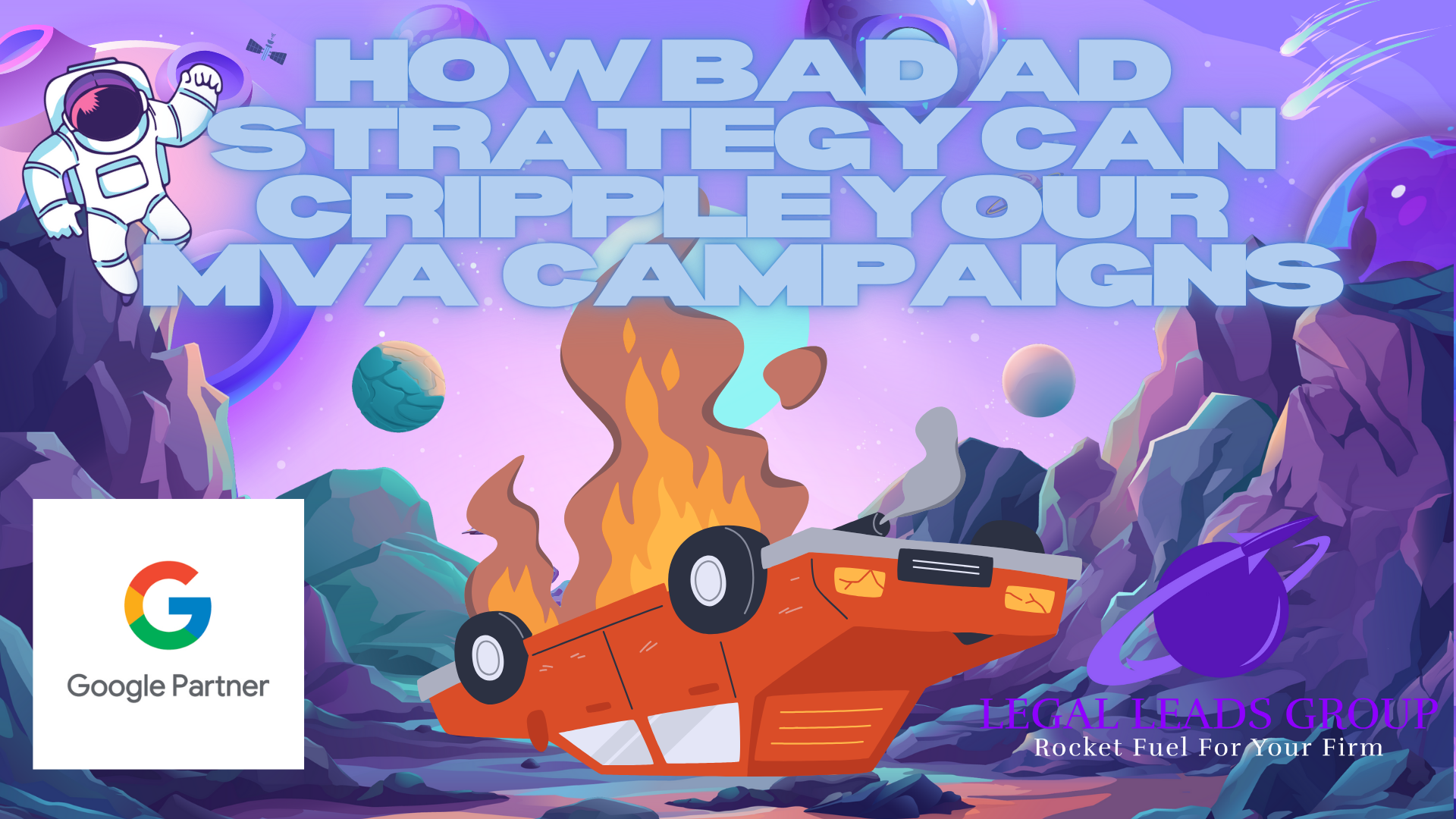
How Misaligned Campaigns Sabotage Your Entire Ad Strategy
Misaligned ad campaigns—those that mix medical malpractice keywords with motor vehicle accident (MVA) targeting—can wreak havoc on your entire Google Ads strategy. When your campaign blends unrelated keywords, it confuses Google’s algorithm and muddles your audience targeting. For instance, if your ads contain phrases like “auto accident attorney” alongside “medical malpractice lawyer,” Google struggles to classify your campaign intent, often serving your ads to irrelevant searchers. This confusion results in lower click-through rates (CTR), higher cost-per-click (CPC), and wasted impressions on unqualified traffic. Worse yet, prospects who click on your ad expecting malpractice help may quickly leave your landing page, further signaling to Google that your campaign is irrelevant—and diminishing your Quality Score.
The ripple effect of misaligned campaigns doesn’t stop with wasted clicks—your ability to attract high-quality auto accident leads suffers as well. As Google’s algorithm penalizes your campaign for low relevance and poor engagement metrics, the visibility of your ads decreases across the board. Your highest-value MVA keywords experience reduced impression share, and your cost per lead rises significantly. By mixing keywords with contradictory intent, you also dilute the message of your ad copy and landing pages, which reduces your authority and trustworthiness in the eyes of potential clients. To avoid this costly sabotage, law firms must create segmented campaigns that focus solely on traffic related to motor vehicle accidents. Clear differentiation ensures audiences find the specific help they need while protecting your budget from irrelevant clicks.
Blended Keywords Dilute Your Message and Lower Conversion Rates
When your ad copy or campaigns mix terms like “auto accident lawyer” with “malpractice lawsuit attorney,” Google’s algorithm struggles to classify your intent. This combination confuses both prospects and Google, leading to:
- Lower ad placements: Google penalizes ads with unclear targeting by reducing visibility.
- Diminished trust from searchers: Users expecting MVA-specific help are less likely to click if malpractice terms appear alongside your content.
- Damaged Quality Scores: High bounce rates and poor landing page engagement leave a lasting scar on campaign performance.
Damaged Quality Score Drives Up Costs Across Your Account
Google closely monitors metrics like bounce rates and session engagement to determine ad relevance. Misaligned targeting that leads to irrelevant clicks has cascading consequences:
- Lower CTR due to mismatched expectations.
- Higher CPC as penalties for low-quality traffic compound.
- Fewer impressions for priority keywords.
By allowing malpractice queries to distort your Google Ads data, you risk wasting budget on poorly matched leads while simultaneously increasing the cost-per-lead for auto accident cases.
Strategies to Eliminate Malpractice Clicks and Focus on Auto Accident Leads
To refine your Google Ads strategy and attract high-intent auto accident leads, eliminating malpractice-related clicks is crucial. Start by conducting a thorough audit of your keyword list, removing any terms like “malpractice lawyer” or “medical negligence attorney” that don’t align with your firm’s focus on motor vehicle cases. Implement negative keywords strategically to block ad impressions triggered by irrelevant malpractice searches. For example, adding terms like “surgical,” “hospital,” and “doctor error” to your negative keyword list ensures your ads won’t appear to audiences seeking unrelated services.
Additionally, segment your campaigns by practice area and tailor ad copy to explicitly highlight your expertise in auto accident cases, leaving no ambiguity for searchers or algorithms. Optimize landing pages with focused messaging and visuals that resonate with accident victims rather than malpractice inquiries. By narrowing your targeting efforts and leveraging negative keywords effectively, you’ll improve campaign efficiency, reduce wasted spend, and attract more qualified leads for your specific area of legal expertise.
1. Build Comprehensive Negative Keyword Lists
Negative keywords are your first line of defense against malpractice queries. By creating an exhaustive list of terms associated with medical negligence, you can block the majority of irrelevant searches before they siphon your budget.
Examples of Medical Negative Keywords to Add Now:
- Malpractice
- Hospital negligence
- Surgical error
- Birth injury
- Sue doctor
- Medical misdiagnosis
Update your list regularly using insights from your search term reports. Adding new variations as they appear ensures continuous refinement of your campaign targeting.
2. Analyze and Filter Using Search Term Reports
Google Ads provides detailed reports on the exact queries triggering your ads. Use these reports weekly to identify malpractice-related patterns and continually expand your negative keyword list. For example, if terms like “botched surgery claim lawyer” appear consistently, adding these exact phrases to your negative keyword list prevents repeat errors.
Pro Tip: Focus on Root Keywords and Variants
Malpractice queries often include common roots like “surgery,” “hospital,” or “doctor.” Target these terms using phrase match negative keywords to capture broader medical intent without blocking relevant auto injury traffic.
3. Use Exact Match Keywords for High-Intent Auto Accident Queries
Switching to exact match targeting for your auto accident keywords minimizes the chance of irrelevant clicks. Exact match ensures that your ads are only triggered by specific search terms like “rear-end collision lawyer Seattle” or “auto injury attorney Spokane Valley.”
This approach increases relevance, improves CTR, and reduces wasted ad spend. It also communicates to Google that your campaigns are laser-focused on motor vehicle cases, which increases your Quality Score and lowers CPC.
4. Segment Campaigns for Cleaner Traffic Sources
Mixing auto accident keywords with malpractice-related phrases within the same campaign confuses Google’s algorithm. Instead:
- Create separate campaigns for specific case types. Each campaign should focus solely on one category, such as rear-end collisions or drunk driving accidents.
- Use geo-targeting modifiers to refine audience relevance. Keywords like “car accident attorney near Bellevue Square” or “truck crash lawyer downtown Tacoma” provide Google with localized signals for better placements.
Tip: Pair segmented campaigns with equally focused landing pages to maximize Quality Scores and on-page engagement.
Smart Tactics to Keep Traffic Clean and Reduce CPC Risks
Keeping your ad traffic clean and minimizing CPC risks requires employing smart tactics that prioritize relevance and strategic targeting. Start by refining your keyword strategy to include highly specific, intent-driven phrases such as “auto accident attorney near me” rather than generic options like “lawyer.” Use negative keywords to block irrelevant traffic from costly terms that don’t align with your practice area, like those related to malpractice or unrelated legal services. Geo-targeting can further prevent wasted clicks by ensuring your ads only appear to users in your desired locality.
Additionally, continuously monitor your search queries through Google Ads reports to identify any irrelevant clicks or patterns and adjust your campaigns accordingly. Optimizing ad copy with clear, niche-focused messaging—such as emphasizing “car accident legal support”—helps deter non-qualified traffic, ensuring only high-quality leads engage with your ads. By combining precise targeting techniques and ongoing adjustments, you’ll reduce CPC risks while improving ROI through cleaner, more effective traffic.
5. Avoid Passive Targeting Mistakes in Google Ads
Passive filters like broad negative keywords are often too lenient and allow variations to slip through. Instead, use phrase match negatives like “complications from surgery” or exact match negatives such as “hospital malpractice lawyer in Tacoma”. This additional precision ensures future queries with similar intent are blocked as well.
6. Write Ad Copy That Speaks Only to Auto Accident Victims
Your ad language can further filter unqualified clicks. Use headlines and descriptions that:
- Clearly state your specialty. Examples: “We only take auto accident cases—no malpractice claims accepted.”
- Focus on urgency and accident specifics. Example: “Injured in a car crash? Let our attorneys handle insurance claims and damages while you recover.”
This clarity protects your budget by discouraging irrelevant queries from clicking through.
7. Test and Optimize Frequently
Your campaign is dynamic, and Google’s ad environment evolves daily. Conduct A/B tests to evaluate which keywords perform best, refine ad copy regularly, and tweak budget allocations toward higher-converting campaigns.
Tips to Land High-Quality Motor Vehicle Accident Leads
- Create segmented campaigns for clean differentiation between car accident cases and other injury types.
- Aggressively add negative keywords to block irrelevant traffic related to malpractice or medical negligence claims.
- Switch to exact match targeting for high-value keywords like “rear-end accident lawyer near me.”
- Write laser-focused ad copy that reinforces your firm’s specialization in motor vehicle accident claims.
- Optimize landing pages with content exclusively geared toward auto accident victims for seamless consistency.
By refining your targeting and eliminating malpractice traffic, your Google Ads campaigns will yield higher-quality leads and improve your return on ad spend (ROAS). No more wasted budget—just consistent calls and form fills from MVA clients ready to act.
Well-optimized campaigns are the backbone of a successful Google Ads strategy. If you are ready to protect your ad budgets and transform your results, contact Legal Leads Group today for a free strategy session! Call 805-273-8791 now to start getting real auto accident cases.
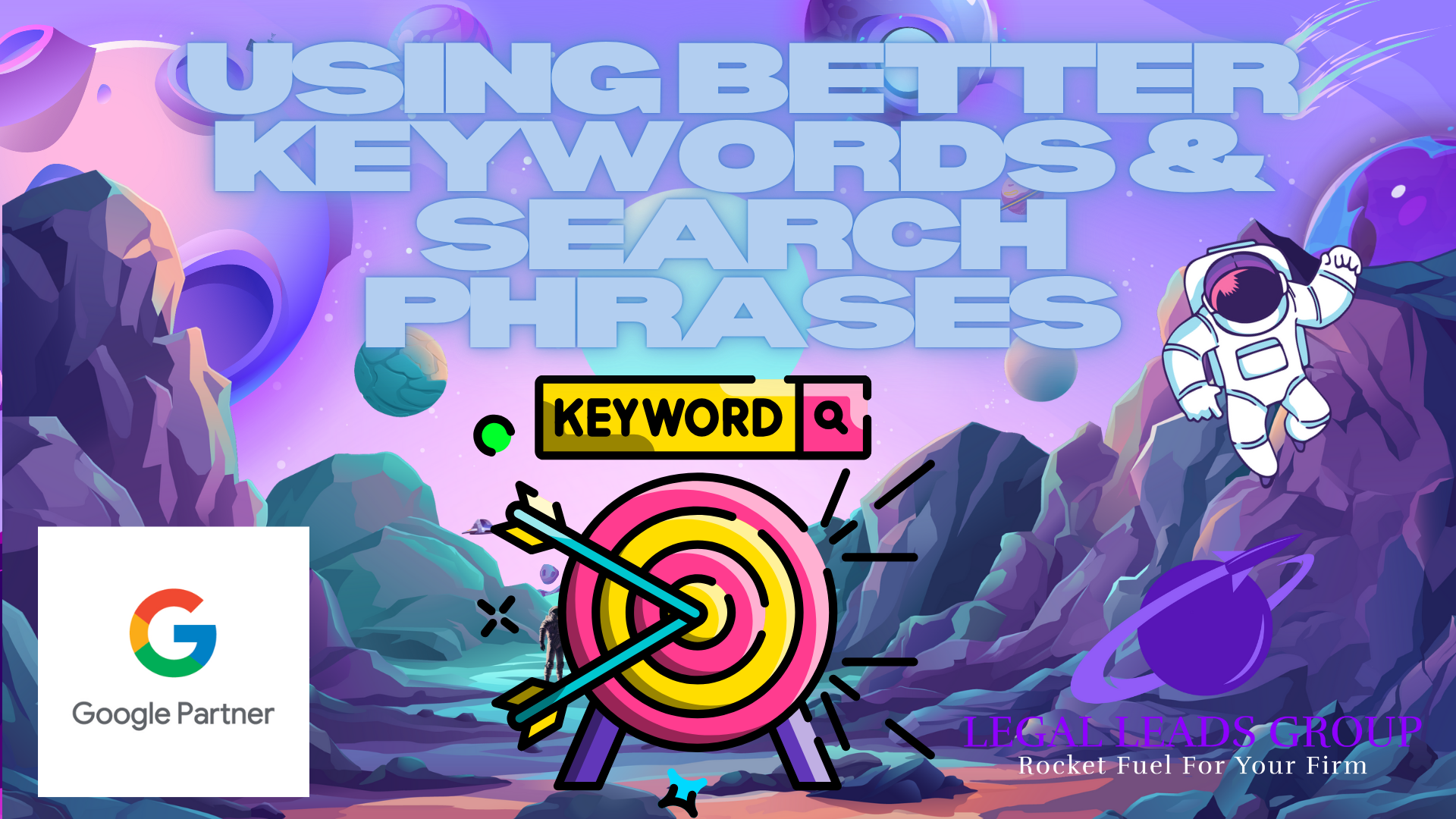
Using Local Intent Keywords to Attract Motor Vehicle Accident Calls That Convert
Law firms dedicated to consistently generating high-quality motor vehicle accident leads know one critical truth: leveraging local intent keywords in Google Ads campaigns surpasses the performance of generic terms every time. People searching for legal help after a car accident often specify the city, neighborhood, or region associated with the incident in their queries, signaling both physical proximity and higher intent. This specificity offers an invaluable opportunity for law firms to craft campaigns that meet the moment with precision. Harnessing location-based keywords that align with user searches—such as “rear-end collision attorney Spokane” or “auto injury lawyer near Renton”—drives higher click-through rates, fosters engagement, builds trust, and improves conversion rates across the board. By combining geographic proximity with focused intent, your campaigns are rewarded by Google Ads with increased Quality Scores, greater visibility, and reduced cost-per-click.
Location-Based Car Accident Keywords Outperform General Terms
In Google Ads campaigns for personal injury law, using generic keywords may attract traffic, but the leads generated often lack relevance. For example, broad terms like “personal injury lawyer” or “accident attorney” fail to capture the nuances of intent behind many searches. Location-based keywords, on the other hand—such as “rear-end car crash lawyer Seattle” or “injury attorney for accidents in Olympia”—consistently outperform this generic approach. Why? Searchers with local intent are actively seeking legal help in their immediate vicinity, signaling urgency and higher intent to convert.
When people search for terms with geographic references, they are often facing pressing issues tied to a specific location, such as a car accident near their home or workplace. Incorporating city- or neighborhood-specific keywords helps your firm stand out among competitors because it addresses the immediate, localized needs of potential clients. For instance, someone searching “auto accident lawyer Seattle Downtown” is likely looking for a firm within a specific radius, making them more likely to call or complete a form rather than continuing to browse. Local intent keywords align with the natural progression of these searches, guiding users toward actionable choices rather than generalized results.
Furthermore, location-specific queries inherently improve campaign engagement metrics. Users searching for “car wreck attorney near Pioneer Square” or “auto injury lawyer Kent” are more likely to click on your ad if the displayed copy and landing page align with their query’s context. In contrast, generic phrases often attract clicks from individuals who may not fully resonate with the service being offered, or whose needs may not align specifically with the expertise of the law firm. This misalignment results in higher bounce rates and wasted ad spend.
From a competitive standpoint, law firms operating in crowded markets like Seattle, Spokane, or Tacoma gain a significant edge by tailoring their Google Ads campaigns toward city-specific queries. Saturated markets often suffer from keyword inflation, where firms bidding on broad terms encounter high CPCs with diluted relevance. Local intent keywords, such as “traffic accident attorney Bellevue” or “rear-ended crash lawyer Kirkland”, help firms refine their targeting by narrowing the geographic scope to areas of higher interest and relevance. This not only reduces wasted clicks but also improves your campaign’s overall cost-efficiency, allowing you to allocate budget more strategically.
Additionally, Google’s algorithm rewards geographic relevance. Ads that match the user’s context—whether it’s their location or a referenced landmark—experience higher Quality Scores, ultimately lowering CPCs and increasing visibility. For example, pairing “Spokane car accident lawyer” with ad copy emphasizing services for “accidents near Spokane Valley Mall” demonstrates heightened alignment with user intent, earning stronger impressions due to Google’s system favoring proximity-based solutions.
Law firms that consistently use location-based keywords often see measurable results not just in traffic volume but in lead quality. These campaigns attract searchers who are ready to take action—book consultations, ask questions, or provide accident details—rather than casual browsers. By investing in geo-specific keywords, firms can cultivate a steady influx of targeted, conversion-ready leads, making their advertising investments significantly more impactful.
Google Favors Geographic Relevance in Personal Injury Search Ads
When it comes to personal injury law, Google Ads campaigns that prioritize geographic relevance consistently outperform those that rely on general targeting. This is because Google’s algorithm heavily factors in location signals when deciding which ads to serve. Searchers looking for legal assistance in the aftermath of a car accident—such as “car crash lawyer Bellevue” or “rear-ended accident attorney Renton”—expect results tailored to their area. Ads that closely align with these geographic contexts stand to gain better visibility, higher Quality Scores, and lower cost-per-click (CPC), setting the stage for more efficient and effective campaigns.
Understanding the Role of Location Signals
Google aims to deliver the most relevant and useful results to users, and location signals play a pivotal role in achieving this. These signals include the IP address of the user, GPS location on mobile devices, search terms with specified cities, and even device settings that indicate a physical region. For example, someone searching “auto injury lawyer Spokane Valley” will likely see ads that are not just geographically relevant but also optimized to appeal to users in that area. Google prioritizes ads that deliver content tied to local landmarks, high-traffic zones, or accident-prone locations, considering these factors even more heavily for keywords with explicit geographic intent.
Aligning Google Ads Components with Geographic Relevance
To fully leverage Google’s favor toward geographic relevance, all key components of an ad campaign—keywords, ad text, extensions, and landing pages—must be geographically aligned:
- Geo-Optimized Keywords
Keywords are the foundation of any campaign, and incorporating geographic markers directly within them dramatically improves relevance. For instance, phrases such as “side-impact collision lawyer Kent” or “hit-and-run attorney near Tacoma Mall” signal that the advertiser understands local dynamics. These keywords help Google’s algorithm identify your ad as the best match for the user’s intent, improving exposure and lowering CPC. - Localized Ad Copy and Extensions
Your ad copy should emphasize your presence in the user’s area, reinforcing trust and relevance. Including details like “Serving clients in Bellevue, Kirkland, and Redmond” or “Experienced accident lawyers in King County neighborhoods” helps potential clients feel connected to the ad. Callout extensions, location extensions, and structured snippets that highlight nearby streets, landmarks, or communities further enhance relevance. For example, an extension such as “Located minutes from Southcenter Parkway” speaks directly to users who recognize that location, signaling familiarity and accessibility. - Custom Landing Pages for Local Queries
Geographic relevance should extend beyond the initial ad into the landing page. When a user clicks on an ad like “Olympia personal injury lawyer”, they should be directed to a landing page that includes specific references to areas or roads such as I-5, Tumwater, or Thurston County Courthouse. Adding local imagery, discussing regional accident trends, and showcasing testimonials from nearby clients can boost trust and conversion rates. Users have stronger emotional responses to ads and sites that feel hyper-relevant to their area.
The Benefits of Location Relevance in Google’s Algorithm
By focusing on geographic relevance, your campaigns gain several advantages within Google’s algorithm:
- Higher Quality Score
Google assigns a Quality Score to every ad, which influences its visibility, CPC, and placement within search results. Ads tied to location-specific keywords, copy, and landing pages typically receive higher Quality Scores because they meet the user’s intent more precisely. This leads to more impressions, better placement, and lower overall costs. - Reduced Cost-per-Click (CPC)
Geographic relevance helps reduce wasted ad spend by attracting clicks from users with a higher likelihood of conversion. Instead of paying for broad, generic clicks from users who may not need your services, your ads target people searching for localized solutions. For example, “auto injury lawyer Bellevue Court” will generate leads closer to your service area, while broader phrases like “personal injury lawyer Washington state” might generate clicks from areas outside your specialty. - Improved Engagement Signals
Ads optimized for geographic relevance often produce better engagement metrics, such as click-through rates (CTR) and conversion rates. Searchers looking for “car wreck attorney near Kent Commons” or “drunk driving accident lawyer Tacoma” are provided with tailored solutions that meet their needs, leading to higher dwell times and stronger interaction metrics on your website. Google rewards these positive signals with greater exposure.
Real-World Applications of Geographic Targeting
In competitive markets, geographic targeting provides a vital edge. Consider the following strategies to maximize conversions:
- Leverage Neighborhood or Landmark Searches
People frequently use geographic markers when searching for personal injury lawyers—terms like “Rear-end collision attorney by Spokane Riverfront Park” or “Lawyer for car accident near Aurora Avenue North”. Incorporate local landmarks, major intersections, or community hubs into your keyword strategy to attract highly relevant leads. - Capitalize on Accident Trends by Region
Use traffic data and accident statistics to identify high-incident areas. For example, a firm in Seattle might optimize its campaigns around queries like “injury attorney for crashes on I-5 near Northgate” based on known accident trends. Demonstrating familiarity with regional accident hot spots instills confidence in prospects searching for legal assistance. - Customize Campaigns for Regional City Clusters
In states like Washington with dense metropolitan regions, firms can run geo-specific campaigns for multiple cities within close proximity. Instead of bidding broadly on “accident attorney Seattle,” consider hyper-local variants such as “auto injury lawyer in Bothell”, “traffic accident attorney near Issaquah”, or “collision attorney Lake Forest Park”. This granular strategy captures leads across smaller, localized areas, increasing volume without inflating CPCs.
Firms Can Earn the Trust of High-Intent Leads
When searchers include specific cities or neighborhoods in their queries, they are looking for more than just legal representation—they want an experienced professional who understands their local area and unique situation. Google rewards advertisers who meet this intent, driving better visibility and click-throughs for ads optimized for local relevance. Whether targeting “car injury lawyer near Vancouver Mall” or “attorney for accidents in downtown Tacoma”, your campaign benefits from aligning strategy with the physical realities of user intent. Investing in geographic relevance isn’t just about lowering CPC—it’s about positioning your firm as the trusted resource for highly motivated prospects in your community.
Law Firms Using Local Keywords Earn More Clicks and Better Leads
Testing across competitive markets like Seattle, Tacoma, Spokane, and beyond reveals that local intent keywords consistently drive higher ROI when compared to more generic ones. For example, law firms using geo-targeted keywords experienced a 52% higher click-through rate and faster conversion cycles, including shorter intake times and higher close rates for initial consultations. Hyper-local keyword specificity not only improves traffic volume but also helps connect firms with leads that are actively searching for services rather than passively exploring options.
Geo-Modified Keywords Enhance Relevance and Build Trust
Searchers who include their city or region in queries signal elevated intent—they’re ready to act and want solutions close to home. Your Google Ads campaigns should be tailored to mirror their behavior. Matching ad structures and keyword phrasing with search intent—such as “Bellingham car crash lawyer” or “rear-ended near Lakeway Drive attorney”—positions your firm as their most relevant option, increasing trust and click-through likelihood. The closer your language aligns with how real people search, the higher the ad’s relevance score in Google’s algorithm, boosting performance metrics overall.
Landing Page Relevance for Higher Quality Scores
A seamless user experience beyond the ad click is just as crucial as keyword optimization. Pairing geo-specific keywords with custom-built landing pages elevates the conversion potential further. Local terms should be strategically placed in headlines, body content, and metadata within the landing page to improve Quality Scores. For example, a campaign targeting “auto injury lawyer in Olympia” should feature landing page messaging like “Serving Thurston County auto accident victims” or details about specific local accident hotspots, such as I-5 or major intersections in the area. These geographic anchors make your ad and webpage more relevant, resulting in lower CPCs and higher conversions. Referencing landmarks or local court systems (e.g., “Near Thurston County Courthouse”) reinforces your page’s relevance to user intent.
Examples of High-Performing Local Keywords
Regional and hyper-local keywords consistently drive motor vehicle accident leads by aligning closely with user behavior. Among Washington state law firms, top-performing geo-targeted keywords include:
- “Car wreck attorney Spokane Valley”
- “Hit-and-run lawyer Federal Way”
- “Drunk driving accident lawyer Tacoma”
- “Side-impact collision attorney Kent”
- “Auto crash law firm near Bellevue Square”
- “Rear-end accident attorney in Yakima”
- “Car injury attorney close to Vancouver Mall”
These keyword variations resonate with high-intent users while earning better relevance scores due to their geographic specificity, making them highly cost-effective with improved lead quality.
Using Google Maps Data to Improve Keyword Targeting
Amplifying the power of geo-local keywords involves integrating insights from traffic patterns, accident hotspots, and key landmarks into campaign construction. While linking directly to Google Maps isn’t ideal, tools like mapping software and traffic heatmaps allow firms to pinpoint high-incident zones with strategic value. For instance, phrases like “auto accident lawyer near Spokane Valley Mall” or “injury attorney for collision at Aurora Avenue North” emulate real-world events, aligning campaigns with actual user queries surrounding crash locations. Incorporating local law enforcement reports and traffic studies helps firms identify the geographic areas driving user interest, ensuring that keywords and Google Ads campaigns match the exact geographic context where legal help is most needed.
By embracing geo-targeted keyword strategies, crafting ad campaigns specific to user behavior, and optimizing landing pages to reflect hyper-local context, law firms can dominate the motor vehicle accident space, capturing the highest quality leads while maximizing Google Ads efficiency.
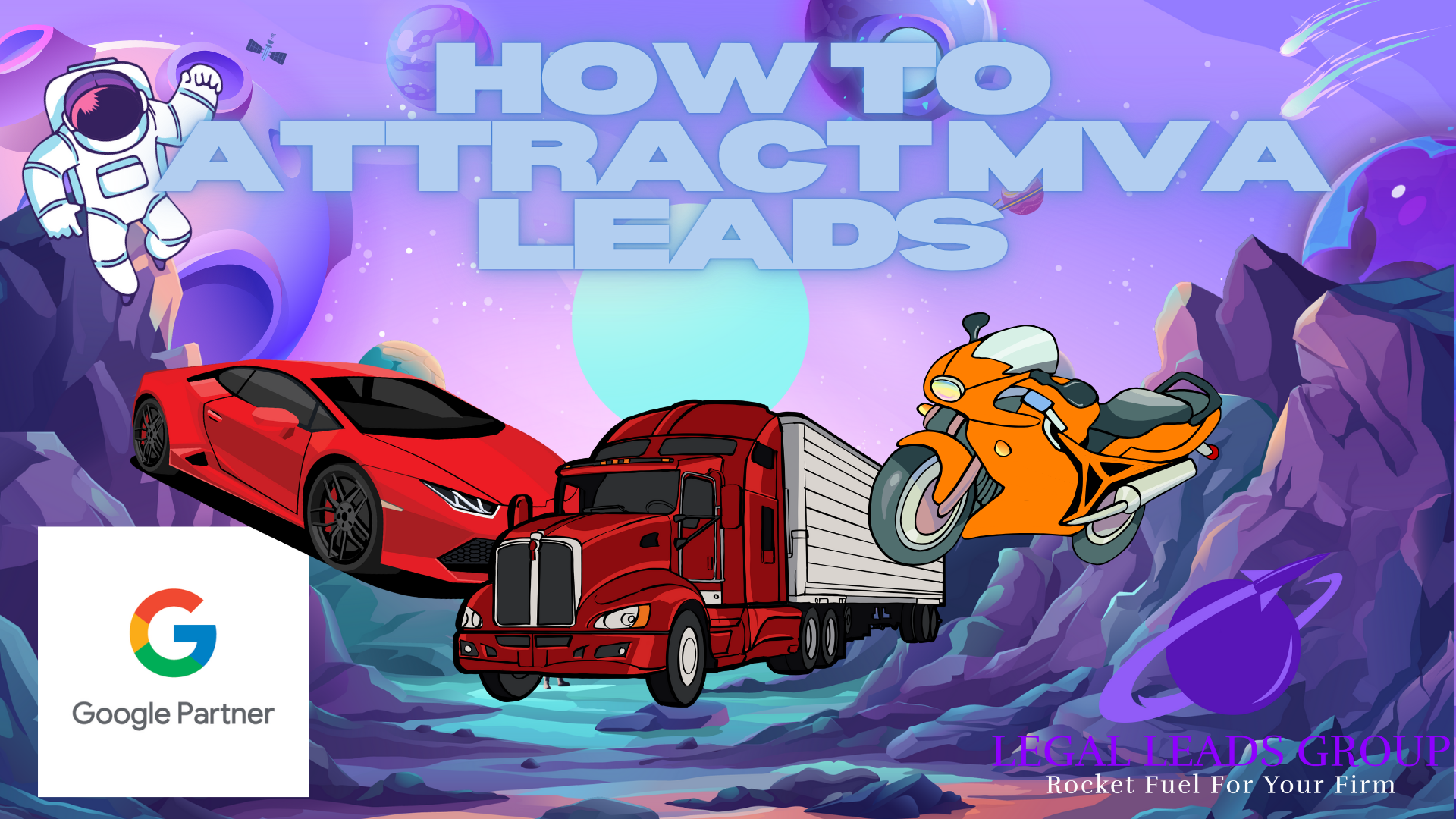
Writing Google Ads That Attract Car Accident Clients and Block Medical Leads
Effective Google Ads start with one goal in mind. You want the right person to click. That means every word of your ad copy should speak directly to motor vehicle accident victims and make it clear you do not accept malpractice inquiries. Filtering begins before the first click ever happens.
Google’s Quality Score rewards advertisers who use relevant, click-worthy language in their headlines and descriptions. When you tailor your messaging to reflect car crash case intent, you increase both ad rank and conversion rate. At the same time, you actively discourage unqualified clicks from users searching for medical-related issues.
Headline Strategies That Highlight Auto Injury Legal Services
Your headlines must mirror what the user is searching for while excluding unrelated phrases. This is your first chance to match high-intent MVA keywords with compelling copy that resonates.
Lead With Specific Language That Speaks to Car Crash Victims
Use direct phrasing such as Injured in a Car Accident? or Hit by a Distracted Driver in Seattle? These questions pull in relevant clicks from people actively dealing with a crash. Avoid generic terms like Injury Law Help or Legal Assistance for Victims, which can confuse intent and attract malpractice traffic.
For deeper insight into what makes a strong legal PPC headline, review WordStream’s guide to writing high-CTR Google Ads.
Include Local Context to Build Trust and Relevance
If your ads mention places like Bellevue, Tacoma, or Vancouver WA, Google increases the local relevance score. More importantly, users feel like your firm knows the area and understands local road issues. This small tweak boosts your CTR and helps improve your ad’s Quality Score.
Use headlines like:
- Crash in Downtown Spokane? Call a Local Attorney Today
- Auto Injury Lawyer Helping Vancouver Drivers Recover Faster
- Serious Car Accident in Renton? Get Legal Help Now
Description Text That Blocks Out Malpractice and Drives MVA Calls
After the headline grabs attention, the description closes the deal. This is where you clarify who you help and who you do not. Use this space to make it obvious you represent motor vehicle accident cases only.
State Your Case Type Clearly to Prevent Malpractice Confusion
Example copy that works well:
- We handle car, truck, and motorcycle accident claims only. No medical or hospital cases accepted.
- If you were injured in a vehicle crash, speak with a lawyer now. We do not take malpractice lawsuits.
- Auto accident attorneys helping local drivers recover lost wages and damages from negligent drivers.
When users read this, they immediately know whether they’re a fit. That reduces bounce rates and improves the landing page experience score in Google’s algorithm.
Use Legal Callouts That Resonate with MVA Victims
Highlight urgency and common pain points. Include statements like:
- No fee unless we win your car accident case
- Free legal evaluation for recent crash victims
- We fight insurance companies after rear-end collisions
Google rewards clarity and authority. The more your description reflects the searcher’s actual problem, the better your ad will perform in both cost and visibility.
Leverage Ad Extensions to Reinforce MVA Intent
Ad extensions give you more space to guide the user before they click. These help reinforce that your practice focuses on vehicle-related injury claims and not general injury law.
Best Google Ad Extensions for Car Accident Campaigns
- Call Extensions: Let users call your intake team directly without visiting your site.
- Sitelinks: Link directly to pages like Car Accident Claims, Truck Crash Cases, or Free Case Evaluation.
- Structured Snippets: Use labels like Case Types: Rear-End Collisions, Distracted Driving, Rollover Accidents.
- Location Extensions: Show your address and city to highlight your local presence.
Proper use of extensions improves ad performance and enhances your expected CTR, which directly impacts your Google Ads Quality Score. For a closer look at top-performing extensions in legal campaigns, check Search Engine Journal’s PPC extension best practices.
Remarketing for Auto Accident Leads Without Retargeting Malpractice Traffic
Law firms often make one costly mistake when setting up remarketing. They retarget everyone, regardless of the page they visited or the keywords they used. If you’re looking to get car accident cases from Google Ads, your remarketing strategy must match that goal. You cannot afford to follow a user around the internet if they were searching for medical malpractice representation instead.
Effective remarketing starts with segmentation. You must separate your motor vehicle accident traffic from unrelated injury queries. When done correctly, this targeting strategy boosts your conversion rate, lowers cost per lead, and dramatically improves your Google Ads Quality Score over time.
Segment Your Audiences Based on Their Case Intent
Remarketing works best when the message reflects the user’s previous actions. By separating your auto crash visitors from general personal injury clicks, you ensure that only those who showed actual MVA intent see your follow-up ads.
Build Audiences Using Page-Level Behavior and Keyword Data
If someone visits your Car Accident Claims page or enters through a Google Ad with rear-end collision attorney Seattle, they belong in a remarketing list focused on vehicle injuries. But if they landed on your site through phrases like sue hospital for negligence, they must be excluded.
Tools like Google Ads audience manager allow you to build these segments based on URLs, time on site, and ad group-level triggers. Filter wisely and only keep those who align with your motor vehicle accident intake goals.
Avoid Retargeting Visitors with Malpractice Search Terms
Use negative keyword triggers and search term reports to suppress users who landed on your site while searching for medical-specific language. If they typed surgical error lawyer or negligent diagnosis lawsuit, exclude them from follow-up display ads. This prevents budget waste and keeps your click-through rate and engagement metrics high.
Write Ad Copy That Speaks to Auto Accident Victims Only
Once your remarketing list includes only those with car crash intent, tailor your display ads and responsive ads to reinforce urgency and trust. Avoid generic injury law language and stay focused on car accident pain points.
Use Emotionally Relevant Messaging for Car Crash Leads
Effective ad examples include:
- Still recovering from a car crash injury and need legal support now
- Auto accident occurred in Bellevue with legal representation available today
- Injured in a recent Seattle collision and ready to schedule a free case review
- Compensation available for lost wages following a rear-end car accident
Retarget With a Dedicated Auto Accident Landing Page
Clicking on a remarketing ad should never bring a user to a general legal homepage. That’s where many law firms lose conversions. Your remarketing destination must align with the case type and local intent the user originally showed.
Customize Your Landing Page Around Car Accident Recovery
Include city-specific references, crash types, and common concerns like medical bills or vehicle repairs. Headlines such as Local Representation for Car Wrecks in Tacoma or Auto Injury Help After I-5 Highway Crashes show search engines and users that your page is highly relevant.
For inspiration on how targeted landing pages improve conversions and Google Ads performance, see Unbounce’s case study on segment-specific landing pages.
Timing and Frequency Matter in Your Remarketing Strategy
How often your ads appear and when they appear plays a big role in converting qualified traffic. Auto accident victims often wait a few days before calling an attorney. This gives remarketing a critical window to stay top of mind.
Set a 7 to 14 Day Retargeting Window for Auto Cases
People involved in car accidents may not take action immediately. Setting a 7 to 14 day remarketing window allows your ads to appear during their research phase without becoming intrusive. You can even create frequency caps to avoid ad fatigue.
Adjust Messaging Based on Visit History and Repeat Engagement
If someone visits your site twice in a 48-hour span, serve them a more direct ad like Let Us Review Your Accident Today Before Insurance Calls You First. Google Ads allows you to segment by frequency, session count, and engagement time.
Key Elements That Make a Remarketing Campaign Work for Car Accident Leads
Below are specific components that help maximize the performance of a car accident-focused remarketing strategy:
- Create segmented audiences based on URLs like /car-accident-claims or /auto-injury-help
- Exclude anyone who came from malpractice-related search queries or landing pages
- Use visuals that reinforce vehicle crash context such as damaged cars, road scenes, or client testimonials
- Write ad copy that speaks directly to accident pain points and includes urgency
- Direct traffic to a conversion-ready landing page built around crash-related legal help
- Monitor engagement data in your Google Ads dashboard weekly and refine as needed
Mobile-First Campaigns Bring More Car Accident Calls from Local Drivers
Most people involved in motor vehicle accidents do not go home and start their legal search on a desktop. They pull out their phones, open Google, and type phrases like car accident lawyer near me or hit by a driver on I-5 Seattle. If your ads are not designed for that mobile-first intent, you’re missing your best shot at converting high-intent leads.
Mobile search traffic now dominates local legal services, especially in personal injury. Google’s algorithm rewards ads that perform well on phones by giving them better Quality Scores, higher placements, and lower CPCs. Your car accident campaigns must prioritize mobile behavior at every stage, from keyword strategy to CTA execution.
Why Car Accident Leads Come from Smartphones First
Mobile traffic consistently generates more qualified car accident inquiries than desktop. Crash victims often search for legal help while still dealing with the aftermath of the incident.
Phone Searches Reflect Urgency and High Conversion Intent
When someone searches rear-end accident attorney Tacoma on mobile, they’re often ready to speak with someone immediately. That urgency is valuable. Mobile searchers convert at a higher rate when your ads make it easy to call or request a consultation fast. According to Think with Google’s mobile legal search data, mobile click-to-call features drive more leads in personal injury law than any other action.
Local Keywords Improve Mobile Ad Placement and Visibility
Google prioritizes local intent on mobile. Using location-based keywords like crash lawyer Spokane Valley or collision injury attorney near Renton helps your ad show up in map packs and high-value mobile placements. These positions are where your ideal clients scroll and tap most often.
Design Google Ads with a Mobile-First Structure
You must build your ad campaigns to meet the behavior of mobile users. Your headlines, extensions, and CTAs need to be short, direct, and immediately useful.
Write Ad Copy That Shows Well on Small Screens
Mobile users skim quickly. Make sure your headline grabs their attention in under five words. Phrases like Injured in a Crash? or Speak to a Car Accident Lawyer Now work because they match urgency with intent. Avoid long sentences or generic messaging.
Use Call Extensions and Mobile-Optimized Sitelinks
Call extensions are a must-have. They let users call your firm with a single tap. You can also use site link extensions to direct users to mobile-specific pages like Free Evaluation, Recent Settlements, or Auto Accident FAQs.
To see how properly structured mobile extensions improve campaign performance, visit Search Engine Land’s deep dive on mobile ads.
Build Mobile Landing Pages That Convert Auto Accident Traffic
Once someone clicks, your landing page has seconds to keep their attention. If the page is slow, cluttered, or desktop-heavy, the user will leave before your intake team ever gets the call.
Speed and Simplicity Increase Mobile Conversion Rates
Keep your page loading in under 3 seconds. Limit distractions. Put the phone number at the top with a Click to Call button. Use one CTA per page and remove excessive navigation.
Google’s PageSpeed tool can help you test mobile performance and identify quick wins that improve Quality Score and user experience.
Write Page Content That Speaks to the Mobile Accident Victim
Use short paragraphs, bold subheadings, and clear offers. Headlines like Get Help After a Car Accident Today followed by We only take vehicle injury cases. No malpractice. sets expectations and filters leads right away.
You can view a mobile-optimized example by reviewing our personal injury marketing blog for attorneys, where structure, CTA flow, and mobile usability work together to drive conversions.
Guide Mobile Users to Action with Simple and Trustworthy Conversion Paths
Every mobile campaign must guide the user toward a single, clear action. Start with a large, tap-to-call button placed both at the top and bottom of the landing page to reduce friction. Include one-click form buttons labeled with action-oriented text like Start My Free Case Review to give users a fast alternative if they are not ready to call. Incorporate location-based language in your headlines, such as Serving Car Accident Victims in Kent WA, to strengthen local relevance and trust. For those who prefer texting over speaking on the phone, offering SMS integration can dramatically improve engagement and response rates. Finally, reinforce confidence by using credibility markers like No Win No Fee, Local Attorneys Only, and We Don’t Handle Medical Malpractice Cases. These not only build trust but also help prevent the wrong leads from filling out your forms or calling your team.

The Real Cost of Letting Google Smart Campaigns Run Unchecked
Smart Campaigns inside Google Ads often promise simplicity. They offer an automated setup designed to “optimize” your traffic and help you get more leads with less effort. But for personal injury law firms focused on car accident cases, the opposite usually happens. The automation lacks nuance. It groups malpractice, premises liability, and auto accident searches under the same roof. That lack of separation causes expensive misfires, drains your budget, and delivers leads your intake team cannot use.
The real cost is not just in wasted clicks. It is in lost visibility for the keywords you actually want and lower Quality Scores across your entire account. When you let Google decide what counts as relevant, you give up the strategic control that separates profitable firms from those stuck with low conversion numbers.
Why Smart Campaigns Blur the Line Between Case Types
Smart Campaigns rely on Google’s machine learning to determine keyword relevance, ad placement, and audience targeting. For general service businesses, this can work. But legal marketing, especially in personal injury, demands precision. Google’s system does not always understand the legal difference between a car wreck claim and a medical negligence lawsuit.
Machine Learning Ignores the Subtleties of Injury Law Campaigns
When Smart Campaigns detect terms like injury lawyer or personal legal help, they automatically expand targeting. This leads to impressions for surgical errors, birth trauma, or hospital mistakes, none of which match your MVA intake strategy. That mismatch lowers engagement and click-through rates, which in turn harms your Google Ads Quality Score.
Automated Systems Often Disregard Negative Keyword Filters
Even when you upload negative keywords, Smart Campaigns sometimes override or ignore them due to how they bundle queries. If someone searches can I sue a doctor for a misdiagnosis, your ad could still trigger under general injury phrasing, especially if your ads include words like accident, injury, or claim without clear exclusions.
To better understand how Smart Campaigns operate across verticals and why manual control matters, review Search Engine Journal’s breakdown of Google Ads automation limitations.
Loss of Campaign Control Leads to Lower Quality Score and Higher CPC
When irrelevant clicks pile up, Google begins to see your ads as poorly matched. It penalizes your campaigns by decreasing ad relevance and landing page experience scores. The result is a lower Quality Score and increased CPC across all keywords, even the ones that were performing well.
Poor Relevance Scores Push Down Ad Rank in Competitive Markets
In markets like Seattle, Portland, or Sacramento, where competition for car crash keywords is intense, Smart Campaigns put you at a disadvantage. You end up bidding higher for worse placement because Google no longer sees your ad as the best match for a high-intent search. This erodes your ROI quickly.
You Pay More for Leads You Cannot Sign
When malpractice searches click through to a page designed for auto accident claims, those users bounce fast. That high bounce rate signals to Google that your ad and landing page are not aligned. Over time, even your qualified car wreck traffic starts to become more expensive as your campaign’s historical performance drops.
Take Back Control by Switching to Custom Search Campaigns
You do not need to shut down your ads to fix this. You simply need to rebuild your campaigns using manual settings, exact and phrase match keywords, and clear segmentation between case types.
Structure Campaigns Around Specific Auto Injury Topics
Build separate campaigns for rear-end collisions, t-bone crashes, drunk driving injuries, and other specific auto case types. Assign one theme per campaign. Avoid bundling all personal injury services into a single Smart setup. This structure gives you total control over ad copy, landing page direction, and keyword triggers.
Use Phrase and Exact Match to Filter Out Medical Intent
If your firm only handles auto cases, set keywords like car accident lawyer Spokane or truck wreck attorney Tacoma to exact match only. Pair this with a robust list of medical negative keywords including malpractice, doctor, surgical error, and hospital negligence. These filters protect your budget and keep your Quality Score high.
For more on structuring law firm campaigns the right way, refer to our full breakdown on launching personal injury attorney Google Ads the right way.
Avoid These Common Traps When Leaving Smart Campaigns
Making the switch from Smart to manual campaigns requires more than just flipping a setting. Many law firms fall into the trap of copying their existing ad copy and dropping it into a new manual campaign without first editing for alignment with tightly matched keywords. This results in vague headlines that fail to reinforce relevance, which hurts both click-through rate and Quality Score.
Another common mistake is using broad match keywords without preparing a carefully built negative keyword list. If your goal is to eliminate malpractice clicks, broad match alone opens the door to irrelevant traffic unless closely managed. Many advertisers also make the error of pointing all traffic to their homepage instead of a tailored landing page built specifically for car accident cases. A generic page confuses users, weakens the call to action, and reduces your chances of converting high-intent leads.
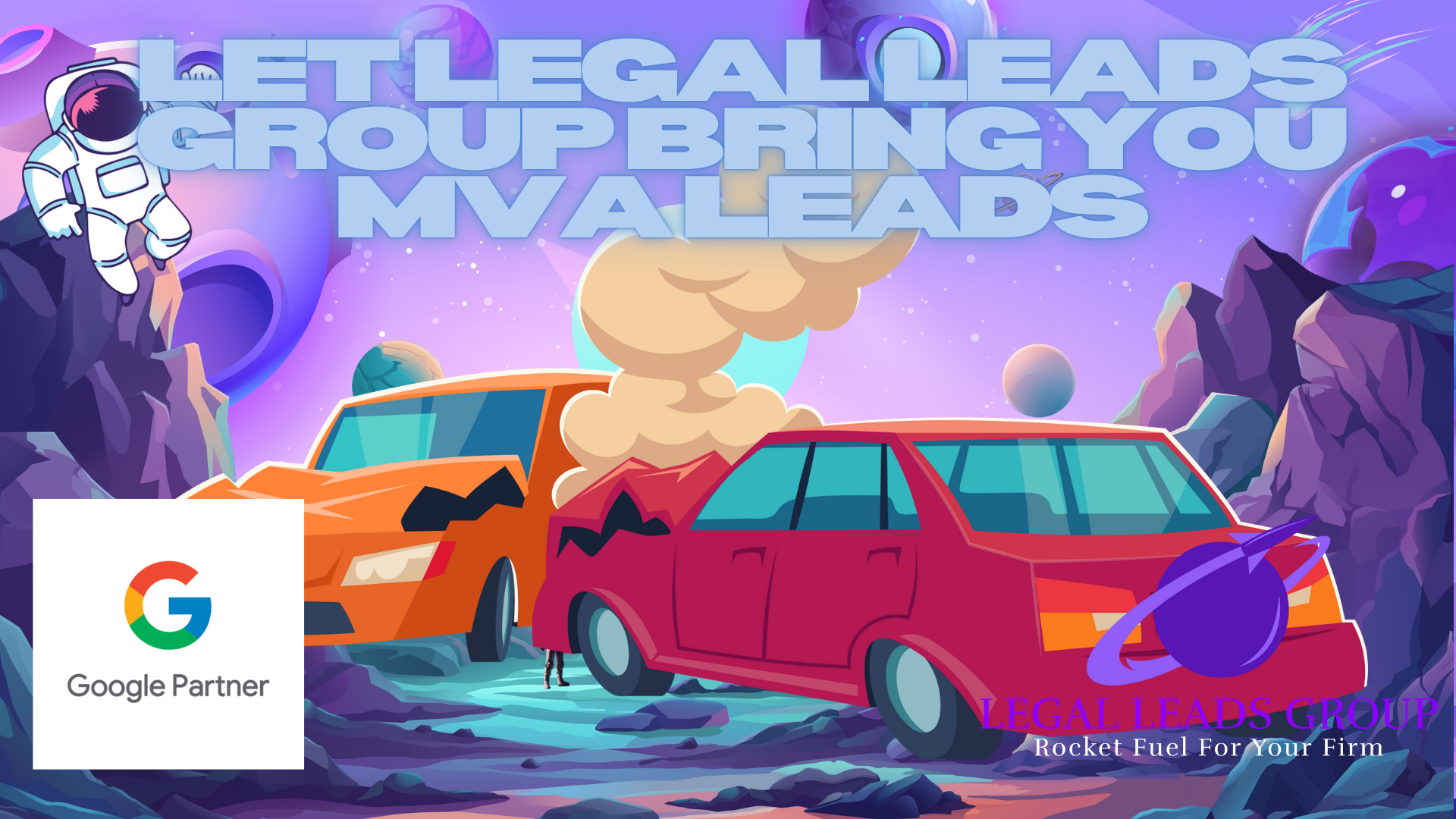
How We Help You Get More Car Accident Cases with Google Ads
When it comes to generating consistent car accident leads through Google Ads, your campaign must do more than just run. It must perform. Every part of your funnel, from keyword structure and landing page copy to call tracking and intake, must align with the exact type of case you want. That is what we do at Legal Leads Group.
We help law firms move away from generic marketing approaches that attract the wrong types of clients. Our team builds fully customized campaigns designed specifically to bring in motor vehicle accident cases, not medical malpractice inquiries. We handle the full setup, ad segmentation, geo-targeting, negative keyword building, and mobile-first design strategy that filters traffic from the very first click.
At Legal Leads Group, we also develop conversion-optimized landing pages that speak directly to crash victims in your local market. Whether your practice is based in Spokane, Tacoma, or anywhere in between, we make sure your message matches the intent of the person searching. We include precise local language, structured call-to-action placement, and simplified forms that help your intake team sign more cases.
In addition to full Google Ads management, we implement call tracking systems that show you exactly which leads come from which campaigns. You see how users interact, what search terms triggered your ad, and which ads lead to actual case signings. We bring transparency to your marketing so you can see the true value of your investment. If a lead mentions back pain from a car crash in Olympia, you’ll know which keyword brought that person to your phone.
We do all of this in-house. No outsourcing, no guesswork, no recycled strategies. Every campaign we build is tailored to your location, your practice, and your target case type. Our legal marketing process is engineered to raise your Google Ads Quality Score, increase lead volume, and cut out the expensive noise caused by malpractice traffic.
If you are ready to stop wasting ad dollars and start signing more car accident clients, our team is here to help. You can learn more about how our process works by visiting the Lucrative Legal package or contacting us directly through our intake page. Get more motor vehicle accident cases now. Call 805-273-8791 for your free strategy session and take control of your Google Ads results starting today.
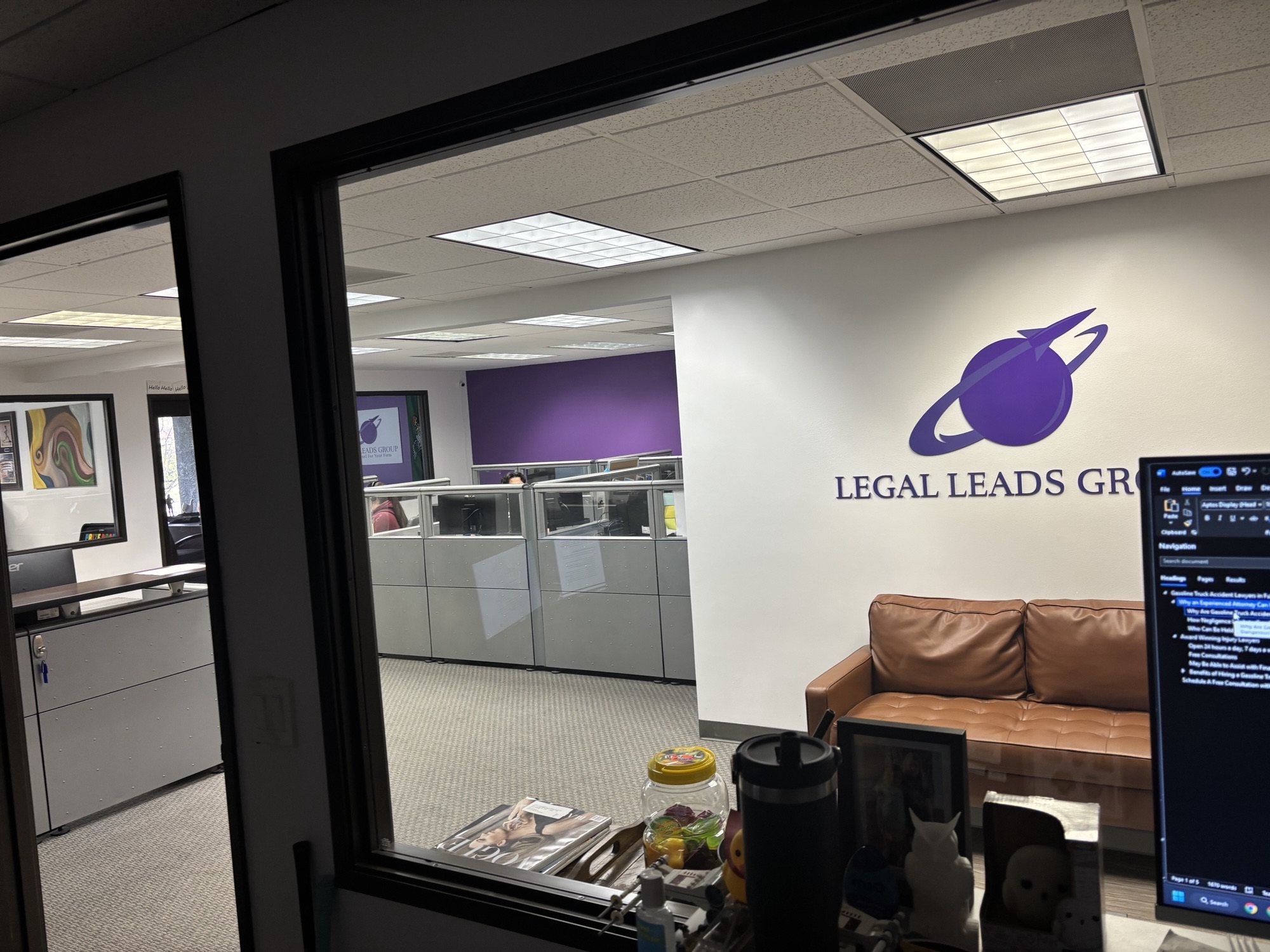
The Best Law Firm Marketing Companies
For over 17 years, Legal Leads Group has helped accident injury attorneys obtain MVA case leads. We understand what personal injury lawyers want because we are owned by accident attorneys. If you would like to learn more about launching an aggressive auto accident case generation campaign, call us today. Our case gen reps are standing by to provide you with a free consultation. We’ve helped personal injury law firms coast to coast land quality MVA cases. Our ad campaigns have produced significant case volume even in the most competitive markets. If you want cases, call Legal Leads Group today.
